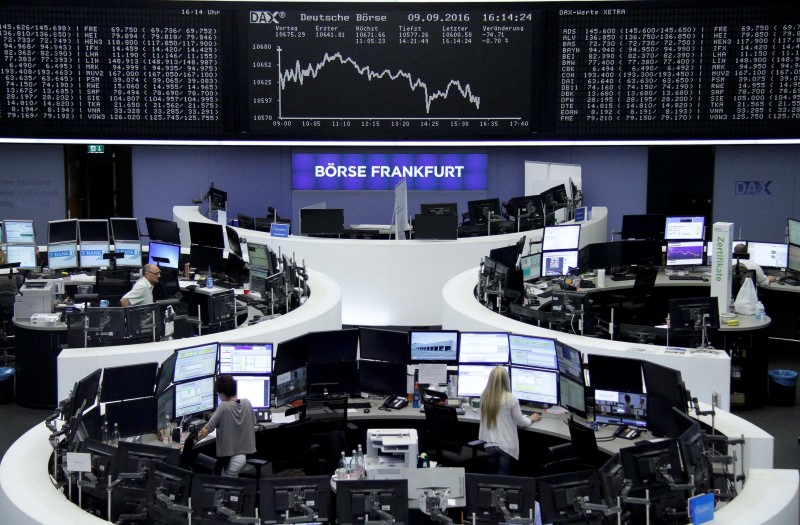By Caroline Valetkevitch
NEW YORK (Reuters) - World stock markets and energy prices fell on Tuesday after both energy producers and consumers predicted an oil glut was likely to persist well into next year.
The International Energy Agency said a sharp slowdown in global oil demand growth, coupled with ballooning inventories and rising supply, mean the crude market will be over supplied at least through the first six months of 2017.
The IEA's comments follow a surprisingly bearish outlook from the Organization of the Petroleum Exporting Countries (OPEC) on Monday that also pointed to a larger surplus next year.
Financial shares fell on weakened prospects of an interest rate hike in the near-term, adding to the negative tone in U.S. stocks, which were down more than 1 percent.
Volatility in stocks and other assets has picked up since Friday as investors have weighed chances of an interest rate hike at the Federal Reserve's Sept. 20-21 meeting.
On Monday, Fed Governor Lael Brainard, the last Fed official to comment before the U.S. central bank's next meeting, kept to a dovish tone on rates and urged caution about removing monetary stimulus too quickly.
"You had this absolute rush of speakers and so many different points of view ... It certainly muddied the waters to a degree. I don't think anybody walked away with clarity of what that means for September. I don’t think that is necessarily a good things for markets," said Jim Tierney, CIO of U.S. Concentrated Growth at AllianceBernstein in New York.
In the energy market, Brent crude (LCOc1) was down 2.1 percent, while U.S. crude (CLc1) fell 2.7 percent.
The S&P energy index (SPNY) was down 2.9 percent, while the S&P financial index (SPSY) was down 1.8 percent.
The Dow Jones industrial average (DJI) was down 224.83 points, or 1.23 percent, to 18,100.24, the S&P 500 (SPX) had lost 29.08 points, or 1.35 percent, to 2,129.96 and the Nasdaq Composite (IXIC) had dropped 57.53 points, or 1.1 percent, to 5,154.36.
MSCI's all-country world stock index (MIWD00000PUS) was down 1.3 percent, while European shares . (FTEU3) closed down 1 percent, marking their fourth down day.
Another trigger for the turmoil of the last few days was disappointment that the European Central Bank did not signal an extension of its bond-buying stimulus program at its meeting last Thursday.
That helped push up yields on government bonds in the euro zone, many of which were negative, as well as yields in Japan, the United States and elsewhere.
On Tuesday, the U.S. dollar recovered while U.S. Treasuries were steady, with the yield curve holding near its steepest levels in more than one month.
Long bonds have underperformed in the past month, in line with a steepening yield curve in Japanese government bonds, with the Bank of Japan studying options to steepen the yield curve to help prompt new lending by banks.
Thirty-year U.S. yields (US30YT=RR) held just below 2-1/2-month highs at 2.47 percent on Tuesday. They have jumped from 2.22 percent last Thursday.
The U.S. dollar index (DXY) was up 0.4 percent.
For Reuters new Live Markets blog on European and UK stock markets see reuters://realtime/verb=Open/url=http://emea1.apps.cp.extranet.thomsonreuters.biz/cms/?pageId=livemarkets
